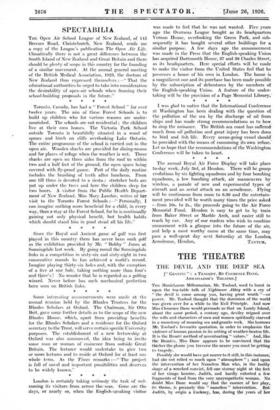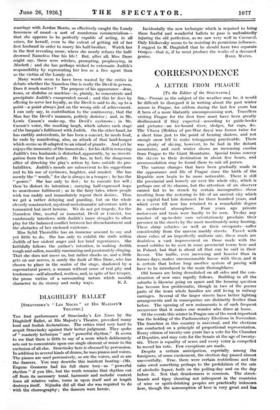THE THEATRE
THE DEVIL AND THE DEEP SEA
r GRANITE " : A TRAGEDY, BY CLEMENCE DANE. AMBASSADOR'S 'MEATY:ET THE Manichaean Millennarian, Mr. Toobad, used to burst in upon the tea-table talk of Nightmare Abbey with a cry of " the devil is come among you, having great wrath "—or power. Mr. Toobad thought that the dominion of the world Was given over for a while to the Evil Principle. And now Miss Clemente Dane would persuade us that on Lundy Island, ' about the same period, a century ago, devilry reigned over the wills and characters of men and women spiritually starved in a monotony of. moaning sea and granite rock. She borrows Mr. Toobad's favourite quotation, in order to emplitthiie the .siolence of human passion in its setting of weather-beaten life. It is the Bronte method of accentuating values." And, like the. Brontiis, Miss Dane appears to be convinced that the thicker the glooin you traverse the nearer you must be getting
to tragedy. . .....
Possibly she would have got nearer to it still, in this instance; had she not reliedoo much upon " atmosphere "_; and upon the intervention of her Nameless Man who, in the .bodily, shape of a wrecked convict, fell one stormy night at the feet of her virago heroine, Judith, and hardly. extorted a few, fragMents of food from the very .unsympathetic woman. No clOubt Miss Dane. would say_ that the .essenee of her play,, its theme, is precisely this " nameless intervention, . But Judith, by origin a ,Cockney, has, during. the years_ if her marriage with Jordan Morris, so effectively caught the Lundy fierceness of mood—a sort of murderous commercialism—
that she appears to be perfectly capable of acting, in all crises, for herself, even to the extent of getting rid of her first husband in order to marry his half-brother. Watch her in the first revealing scene, where she nearly refuses the half- drowned Nameless One his life ! But, after all, Miss Dane might say, there were witches, prompting, prophesying, in Macbeth ; and she has perhaps wished to extenuate Judith's responsibility by representing her less as a free agent than as the victim of the Lundy air.
Many words seem to have been wasted by the critics in debate whether the Nameless One is really the Devil in person. Does it much matter ? The purpose of his appearance—deus, home, or diabolus ex machina—is, plainly, to concentrate and precipitate Judith's exasperated mood ; and this he does by offering to serve her loyally, as the Devil is said to do, up to a point—a point always just on the wrong side of achievement. I can only say, in contribution to the controversy, that the Man has the Devil's manners, politely derisive ; and, in Mr. Lewis Casson's make-up, the Devil's eyebrows ; in Mr. Casson's voice, the mocking laugh, which salutes each stage of the bargain's fulfilment with Judith. On the other hand, he has earthly antecedents, he has been a convict, he needs food, he ends by manifesting, also, an attack of that land-hunger which seems so ill-adapted to an island of granite. And yet he enjoys the immunity of the immortals ; for his skill in removing Judith's two husbands is disturbed, apparently, by no investi- gation from the local police. He has, in fact, the dangerous office of directing the play's action by laws outside its pro- babilities. Judith's moods arc subservient to his suggestions and to his use of eyebrows, laughter, and musket. She has merely the " wrath," for she is always in a temper ; he has the " power." She has only to feel ; he to execute her will ; then 'to distort its intention;. carrying half-expressed hope to unwelcome fulfilment ; as in the fairy tales, where people wish too rashly and immediately repent their desires. Thus we get a rather delaying and puzzling, but on the whole cleverly constructed, mystical-melodramatic adventure with a tormented but inert heroine. 'We do not get tragedy, for the Nameless One, mortal or immortal, Devil or Convict, too cumbrously interferes with Judith's inner struggles to allow play for the balanced conflict between her disenchantment and the obstacles of her enclosed existence.
Miss Sybil Thorndike has an immense amount to say and yet little to do. She has only to exhibit the strife within Judith of her violent anger and her brief repentances. She faithfully follows the author's intention, in making Judith rough and sullen, moodily ruminating and passionately clinging. That she does not move us, but rather shocks us, and a little gets on our nerves, is surely the fault of Miss Dane, who has chosen to place in the centre of the stage, shadowed by a supernatural power, a woman without sense of real pity and tenderness—self-absorbed, restless, and, in spite of her temper, the prone victim of a surrounding nature which moulds character to its stormy and rocky ways. H. J.











































 Previous page
Previous page